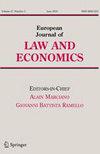频谱管理的多中心系统:土著和部落频谱主权案例
IF 1.1
3区 社会学
Q3 ECONOMICS
引用次数: 0
摘要
我们通过考虑土著和部落频谱主权的经济案例,扩展了对频谱管理的法律和经济分析。我们利用美国、危地马拉、加拿大和新西兰的案例研究来说明,这些运动寻求的是一种多中心的频谱管理制度,与国家政府对频谱管理拥有主要权力的主流单中心频谱管理制度形成鲜明对比。多中心和联邦制理论为土著和部落频谱主权以及更广泛的多中心频谱主权的效率提供了启示。本文章由计算机程序翻译,如有差异,请以英文原文为准。
Polycentric systems for spectrum management: the case of Indigenous and tribal spectrum sovereignty
We extend the law and economics analysis of spectrum management by considering the economic case for Indigenous and tribal spectrum sovereignty. We use case studies from the United States, Guatemala, Canada, and New Zealand to show that these movements seek a polycentric system of spectrum management that contrasts with the prevailing monocentric systems of spectrum management in which national governments have the primary authority over spectrum governance. Theories of polycentricity and federalism offer insight into the efficiency of Indigenous and tribal spectrum sovereignty as well as polycentric spectrum sovereignty more generally.
求助全文
通过发布文献求助,成功后即可免费获取论文全文。
去求助
来源期刊

European Journal of Law and Economics
Multiple-
CiteScore
2.40
自引率
7.70%
发文量
37
期刊介绍:
The European Journal of Law and Economics provides readers with high-quality theoretical and empirical research in which both the legal and economic dimensions merge and combine. The journal welcomes articles that promote a better understanding of legal phenomena, legal decisions made by judges, courts or regulatory agencies, and involving economic tools. Theoretical papers are welcome, provided they have a strong basis in law and economics. We also welcome case studies, as well as empirical analyses – including empirical legal studies – and experimental investigations. The European Journal of Law and Economics does not favor any particular topic, but does have a focus on new and emerging problems. European themes are particularly welcome, because we feel it is important to exploit Europe’s considerable institutional diversity in order to build a more robust body of theory and empirical evidence. However, the purpose of the journal is also to showcase the diversity of law and economics approaches, as supplied by an international mix of authors. Drawing on the support of respected scholars from around the world, who serve as consulting editors and editorial board members, the Editors wish to give contributing authors the opportunity to improve their papers, while also offering them a quick and efficient review process.
Officially cited as: Eur J Law Econ
 求助内容:
求助内容: 应助结果提醒方式:
应助结果提醒方式:


